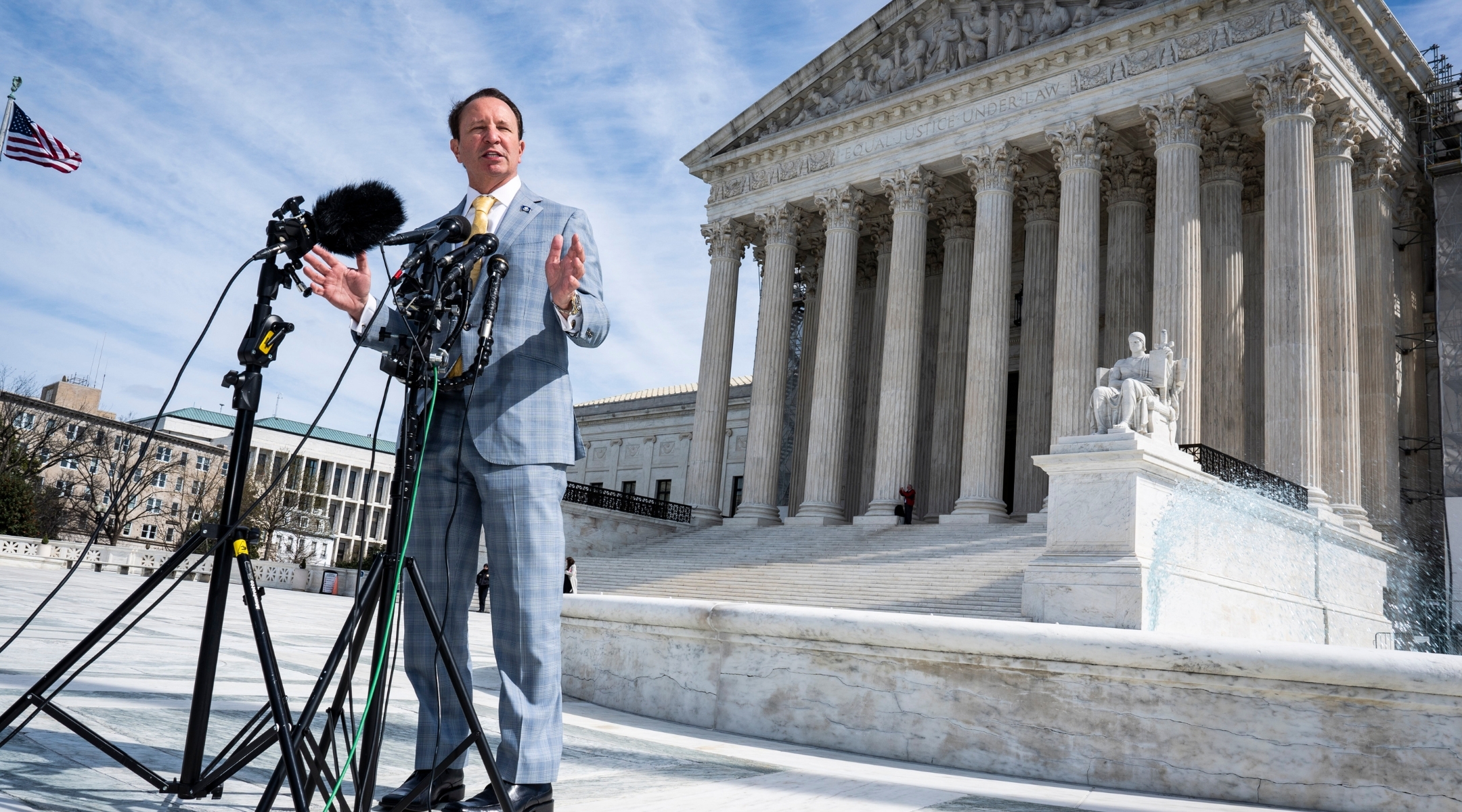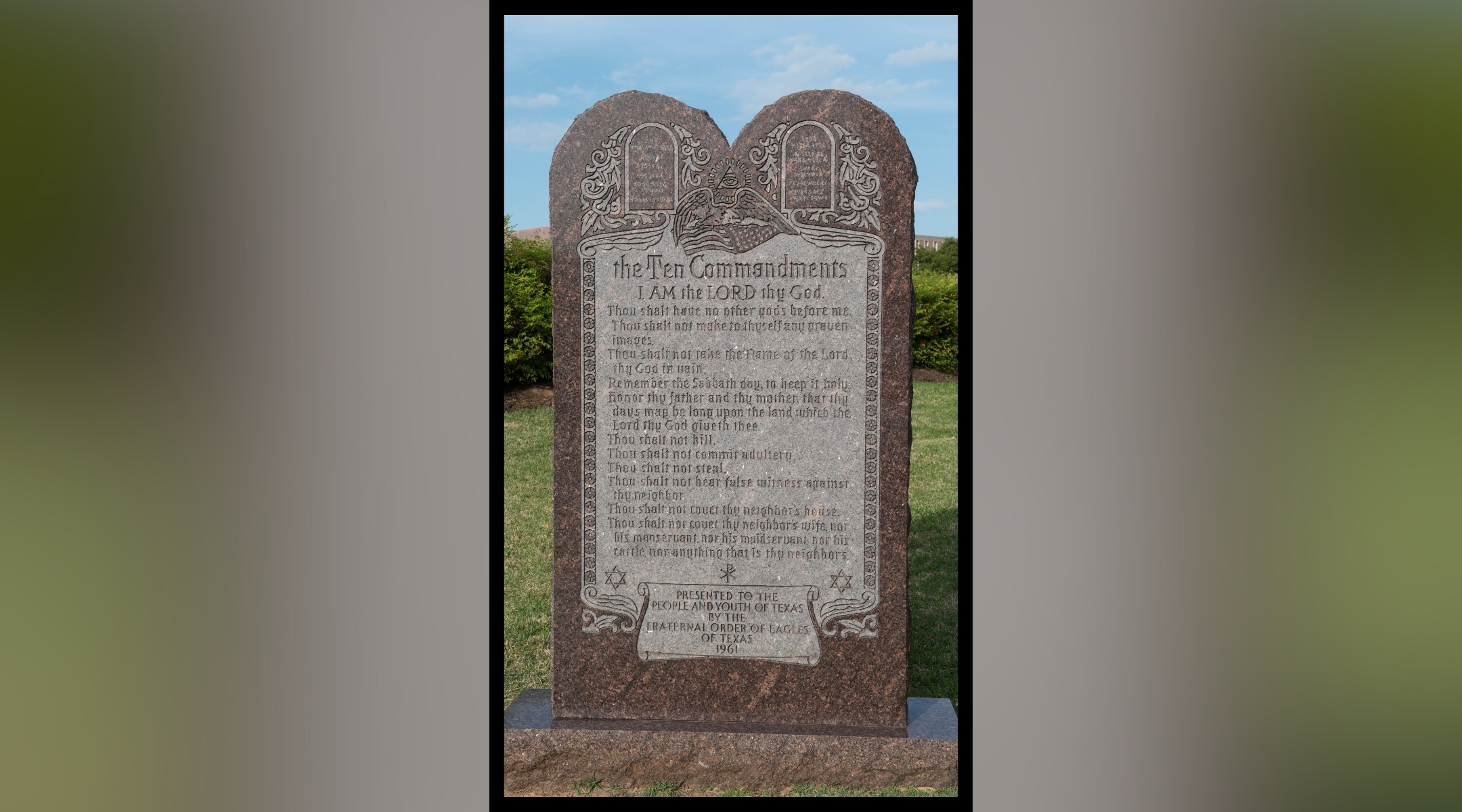Three Jewish families are among a group of nine Louisiana families with children in public schools who have filed a suit in federal court challenging a new state law that requires the Ten Commandments be displayed in all public school classrooms.
The lawsuit — filed on the families’ behalf by Americans United for the Separation of Church and State, the American Civil Liberties Union and the Freedom from Religion Foundation — argues that the law enacted last week violates the First Amendment.
Specifically, the complaint says that the language of the law “Approves and Prescribes One Particular Version of the Ten Commandments, to Which Many People Do Not Subscribe,” violating the Constitution’s prohibitions on establishing an official religion and prohibiting free exercise of religion.
The lawsuit has longstanding precedent on its side: In 1980, the U.S. Supreme Court ruled that a Kentucky state law mandating the Ten Commandments in all classrooms was unconstitutional. But Christian culture warriors, emboldened by the recent arrival of a solidly conservative majority on the court, see an opportunity to have that ruling, Stone v. Graham, overturned.
Now, similar bills have been proposed recently in state houses in Texas, Utah and Oklahoma. None has yet passed, although Texas Lieutenant Governor Dan Patrick pledged days ago that he would make it happen. Louisiana’s Republican governor, Jeff Landry, is the first to sign such a law, doing so last week as part of a slate of legislation against abortion rights and transgender inclusion that he said reflected his values as a Catholic.
Jewish families have played leading roles in religious liberty lawsuits challenging recent legislation by conservative state legislatures. Rabbis in a number of states have sued to block restrictions on abortion, for example, arguing that they are based in Christianity and violate the separation of church and state.
The Ten Commandments, given by God via Moses at Mount Sinai in the biblical book of Exodus (and repeated with slight variations later in the Torah), are revered by both Jews and Christians. But like the abortion lawsuits, the Louisiana lawsuit argues that the text of the Ten Commandments mandated by the law is a Christian version and “does not match any version or translation found in the Jewish tradition.”
Jews and different Christian denominations do number the commandments differently. The version prescribed by the bill omits parts of the commandments, including the section of the first commandment in Judaism about God bringing the Israelites out of Egypt.
Copies of the set of biblical precepts have popped up around the United States since the 1940s, but a breakout moment for their public display came in the 1950s, when director Cecil B. DeMille arranged for versions to be donated to public institutions as a marketing gimmick for his epic film “The Ten Commandments.”
They were prominently placed outside of courthouses, city halls, state capitols and public parks, and even after DeMille’s death in 1961, similar replicas continued to be installed. (How many of the DeMille tablets remain in place is unclear.) Soon, lawsuits questioning their constitutionality were filed.

Louisiana Gov. Jeff Landry addresses reporters after a U.S. Supreme Court first amendment case in March, 2024. (Jabin Botsford/The Washington Post via Getty)
The families that brought the new suit don’t see the commandments as a universal set of divine morals. One of the complainants, Reverend Darcy Roake, a Unitarian Universalist, and her husband Adrian Van Young, who is Jewish and identifies as Reform, have two young children. Both children are members of a synagogue and also attend a Unitarian Universalist church. According to the lawsuit, the parents send their children to public school “to ensure that they receive a secular, religiously unbiased education and have the ability to interact with and get to know peers from a variety of cultural and faith traditions.”
In the lawsuit, the parents argued that they believe “that their children will be pressured to observe, venerate, and adopt the state’s preferred religious doctrine and to suppress expression of their own religious backgrounds and views at school.”
Also included in the suit are Gary Sernovitz, a board member of the Touro Synagogue in New Orleans, and Molly Pulda, a member of the board of the local Jewish community center, who also have a child in public school. They hoped to separate the child’s secular education from their religious education and cited “their desire to oversee the latter and ensure that it is consistent with their Jewish belief and practice.”
Their child goes to Hebrew school once a week and goes to Jewish summer camp, and will begin attending Hebrew school twice a week next year, according to the lawsuit.
Sernovitz and Pulda “do not believe that the Ten Commandments are a universal benign ethical guide,” the lawsuit says, and also believe that the displays will cause an issue for their child as one of only a few Jewish students in their class. According to the lawsuit, they worry their child may feel pressured to suppress the expression of their “own Jewish background and beliefs, including the fundamental Jewish belief in tolerating and supporting the expression of all faiths.”
They also oppose the law because, though it does not accord with the Jewish text of the commandments, they believe the displays “would violate Jewish tenets that oppose proselytizing,” the suit said.
Another complainant is Joshua Herlands, an attorney and business-school professor who has two elementary school-age children in local public schools. He also opposes the law due to the prohibition on proselytizing in Judaism. One of his children attends Hebrew school at a local synagogue, and the family attends synagogue on Jewish holidays and for some community events.
For Herlands, the “displays will religiously coerce his minor children and usurp his parental role in directing their religious education, religious values, and religious upbringing,” the lawsuit said.
Herlands also took issue with the law’s spelling out of the word “God,” which he avoids. Like many Jews, he instead writes out “G-d” to prevent taking God’s name in vain.
JTA has documented Jewish history in real-time for over a century. Keep our journalism strong by joining us in supporting independent, award-winning reporting.






